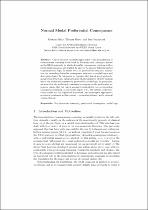JavaScript is disabled for your browser. Some features of this site may not work without it.
- ResearchSpace
- →
- Research Publications/Outputs
- →
- Conference Publications
- →
- View Item
| dc.contributor.author |
Britz, K

|
|
| dc.contributor.author |
Meyer, T

|
|
| dc.contributor.author |
Varzinczak, I

|
|
| dc.date.accessioned | 2012-11-22T13:07:48Z | |
| dc.date.available | 2012-11-22T13:07:48Z | |
| dc.date.issued | 2012-12 | |
| dc.identifier.citation | Britz, K, Meyer, T and Varzinczak, I. Normal modal preferential consequence. 25th Australasian Joint Conference on Artificial Intelligence 2012, Sydney, Australia, 4-7 December 2012 | en_US |
| dc.identifier.uri | http://www.cair.za.net/sites/default/files/outputs/AI-Tightener.pdf | |
| dc.identifier.uri | http://en.varzinczak.net16.net/common/papers/AI12-NormalModal.pdf | |
| dc.identifier.uri | http://hdl.handle.net/10204/6362 | |
| dc.description | 25th Australasian Joint Conference on Artificial Intelligence 2012, Sydney, Australia, 4-7 December 2012 | en_US |
| dc.description.abstract | One of the most successful approaches to the formalization of commonsense reasoning is the work by Lehmann and colleagues, known as the KLM approach, in which defeasible consequence relations with a preferential semantics are studied. In spite of its success, KLM is limited to propositional logic. In recent work we provided the semantic foundation for extending defeasible consequence relations to modal logics and description logics. In this paper we continue that line of investigation by going beyond the basic (propositional) KLM postulates, thereby making use of the additional expressivity provided by modal logic. In particular, we show that the additional constraints we impose on the preferential semantics ensure that the rule of necessitation holds for the corresponding consequence relations, as one would expect it to. We present a representation result for this tightened framework, and investigate appropriate notions of entailment in this context|normal entailment, and a rational version thereof. | en_US |
| dc.language.iso | en | en_US |
| dc.relation.ispartofseries | Workflow;9908 | |
| dc.subject | Non-monotonic reasoning | en_US |
| dc.subject | Preferential consequence | en_US |
| dc.subject | Modal logic | en_US |
| dc.title | Normal modal preferential consequence | en_US |
| dc.type | Conference Presentation | en_US |
| dc.identifier.apacitation | Britz, K., Meyer, T., & Varzinczak, I. (2012). Normal modal preferential consequence. http://hdl.handle.net/10204/6362 | en_ZA |
| dc.identifier.chicagocitation | Britz, K, T Meyer, and I Varzinczak. "Normal modal preferential consequence." (2012): http://hdl.handle.net/10204/6362 | en_ZA |
| dc.identifier.vancouvercitation | Britz K, Meyer T, Varzinczak I, Normal modal preferential consequence; 2012. http://hdl.handle.net/10204/6362 . | en_ZA |
| dc.identifier.ris | TY - Conference Presentation AU - Britz, K AU - Meyer, T AU - Varzinczak, I AB - One of the most successful approaches to the formalization of commonsense reasoning is the work by Lehmann and colleagues, known as the KLM approach, in which defeasible consequence relations with a preferential semantics are studied. In spite of its success, KLM is limited to propositional logic. In recent work we provided the semantic foundation for extending defeasible consequence relations to modal logics and description logics. In this paper we continue that line of investigation by going beyond the basic (propositional) KLM postulates, thereby making use of the additional expressivity provided by modal logic. In particular, we show that the additional constraints we impose on the preferential semantics ensure that the rule of necessitation holds for the corresponding consequence relations, as one would expect it to. We present a representation result for this tightened framework, and investigate appropriate notions of entailment in this context|normal entailment, and a rational version thereof. DA - 2012-12 DB - ResearchSpace DP - CSIR KW - Non-monotonic reasoning KW - Preferential consequence KW - Modal logic LK - https://researchspace.csir.co.za PY - 2012 T1 - Normal modal preferential consequence TI - Normal modal preferential consequence UR - http://hdl.handle.net/10204/6362 ER - | en_ZA |






